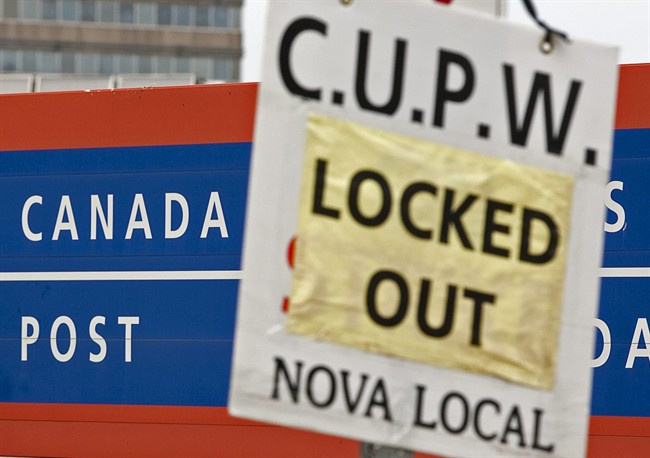OTTAWA – Talks between Canada Post and its union broke off Wednesday night as MPs prepare to deal with back-to-work legislation.

Canada Post said that despite 72 hours of negotiations they have not been able to reach an agreement with the Canadian Union of Postal Workers.
The company in a release late Wednesday said the two sides are far apart on several issues.
The union says the Crown corporation made no significant moves were maintaining 10 demands for major rollbacks.
The House of Commons was expected to break for the summer on Thursday but all parties say they’re prepared to keep sitting through the weekend to debate legislation that would send thousands of locked-out postal workers back on their routes.
The Tories want the bill passed as soon as possible but the NDP wants to delay it to give both sides more time to reach an agreement on their own.
The back-to-work bill contains several controversial measures, including wage rates that are lower than what Canada Post had been offering its union and guidelines for the arbitrator that some suggest are biased towards management.
While the Conservatives will use their majority numbers to cut short discussion on how the bill should be debated, government House leader Peter Van Loan says there are no restrictions on the length of debate on the bill itself.
“If everyone wants to co-operate, we could finish as early as Thursday or early into Friday, but if the other parties are determined to prolong this matter, we could be sitting into the weekend,” Van Loan said following the final Conservative caucus meeting of the spring session.
The bill would then go to the Senate, which has also said it will sit as long as needed to pass the government’s agenda.
Sitting on Friday means parliamentarians will be at work on St-Jean-Baptiste Day, a provincial holiday in Quebec that parallels Canada Day.

Get daily National news
The Liberals said that’s inappropriate.
“We don’t sit on July 1, we don’t think we should be sitting on June 24,” said Liberal Leader Bob Rae.
“So whatever happens, we’re happy to sit on a Saturday, we’re happy to sit on a Sunday but we think it sets a terrible precedent for us to be sitting through that kind of a holiday,” he said.
Conservative Senator Claude Carignan, who is from Quebec, likened the work his colleagues need to do to essential services like nurses and police officers.
“There are plenty of people who work on St. Jean Baptiste Day,” he said in French.
“It’s not our first choice but if it’s what we have to do to make sure postal service resumes as quickly as possible, that’s what we’ll do.”
While the Tories stress the legislation is the only way to avoid economic fallout from a prolonged lockout, NDP Leader Jack Layton suggested any economic damage is their fault.
The union had been carrying out a series of rotating strikes before they were locked out by Canada Post, a Crown corporation, last week.
The workers argue that management barred the doors precisely to get the back-to-work legislation now on the table. Canada Post has said they still want a negotiated settlement.
“It seems pretty obvious to me that Canada Post and the government have been in some kind of discussions,” said Layton.
“If you just look at the way the legislation is constructed and the timing of when it was brought in, it’s pretty much impossible for me to believe that there were no discussions.”
Critics have argued the legislation sets a new course for labour relations policy in Canada – one that dismisses the rights of workers to bargain collectively by signalling that if they oppose their bosses, the government will just step in and enforce a deal.
The Tories have said part of the impetus for the bill was to nudge both sides into coming up with a deal on their own, a tactic that did appear to work last week in another dispute.
Air Canada and its striking workers announced an agreement hours after the Tories introduced back-to-work legislation in that strike.
Opposition parties are caught between a desire to fight for worker rights and an acknowledgment that millions of Canadians just want to get their mail.
Layton argued that all Canadians need to pay attention to how this labour dispute was handled.
“There’s a lot of Canadians that are very concerned about a government that would roll back their salaries or take away their pensions,” he said.
“They are concerned when a government is going to be so high-handed to do that.”
Several hundred union members braved the rain Wednesday morning in Toronto to protest what one union leader called “winner takes all” legislation.
“It’s a total slap in the face not just for postal workers but for the whole labour movement in Canada,” said Darryl Ellis, president of the Toronto local of the Canadian Union of Postal Workers.
“My message to the government today is to stop interfering. We got locked out for a week now. Let us sit down and negotiate with Canada Post.”
People chanted, beat drums and danced at the downtown rally, despite the dreary weather and a malfunctioning sound system.
Tom Gill, 63, a postal worker in Hamilton, said the rights and wages of a new generation of Canada Post workers are in jeopardy.
“This is the worst that we’ve ever been treated, and I go back to days when we didn’t have doors on the washrooms,” said Gill, who has worked for Canada Post since 1970.
“They’ve turned a good job, a job that actually helped the economy, into a Wal-Mart job. This is horrible. For Parliament to step in and take this position is a slap in all Canadians’ faces.”
– With files from Canadian Press reporter Alexandra Posadzki








Comments
Want to discuss? Please read our Commenting Policy first.